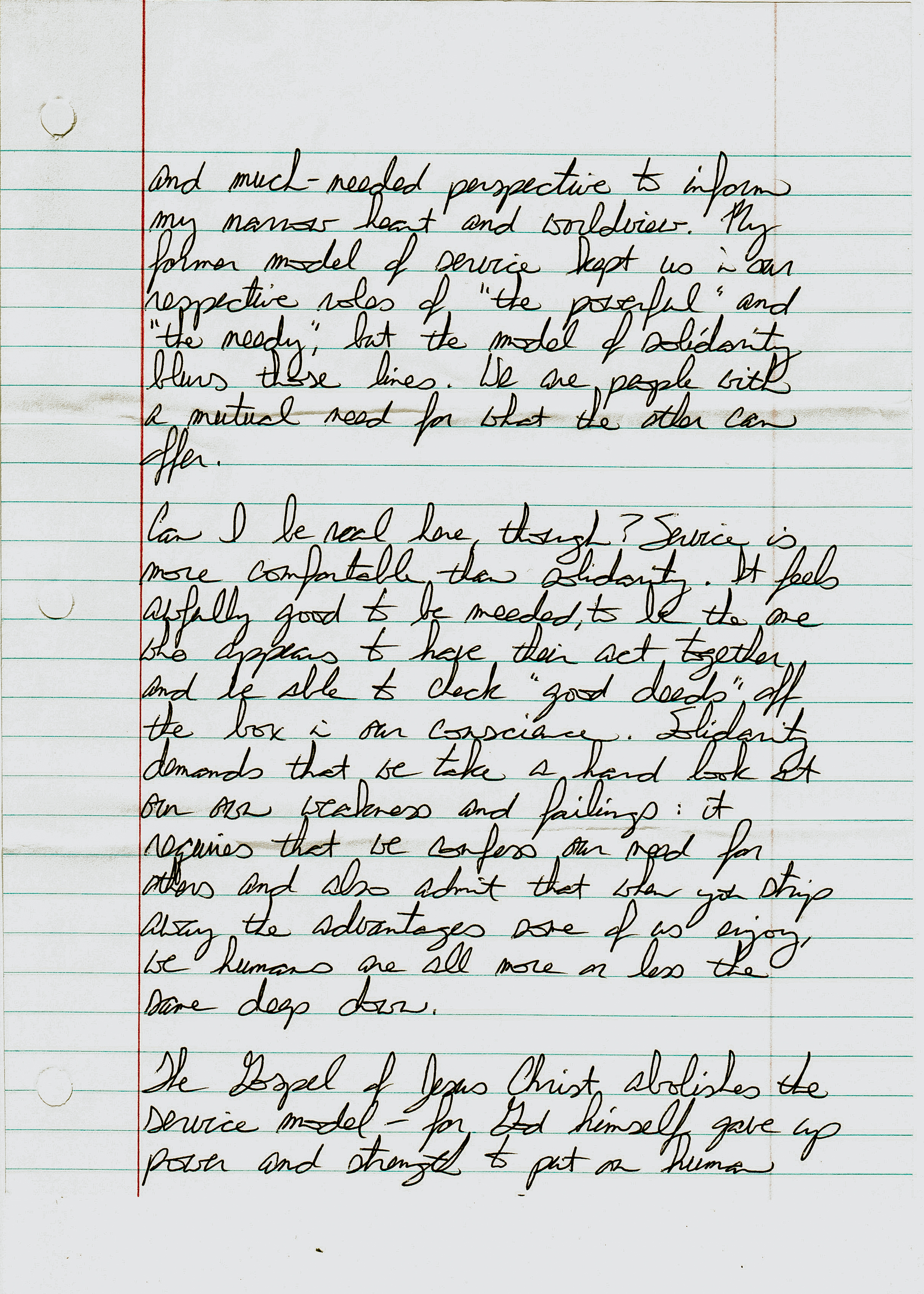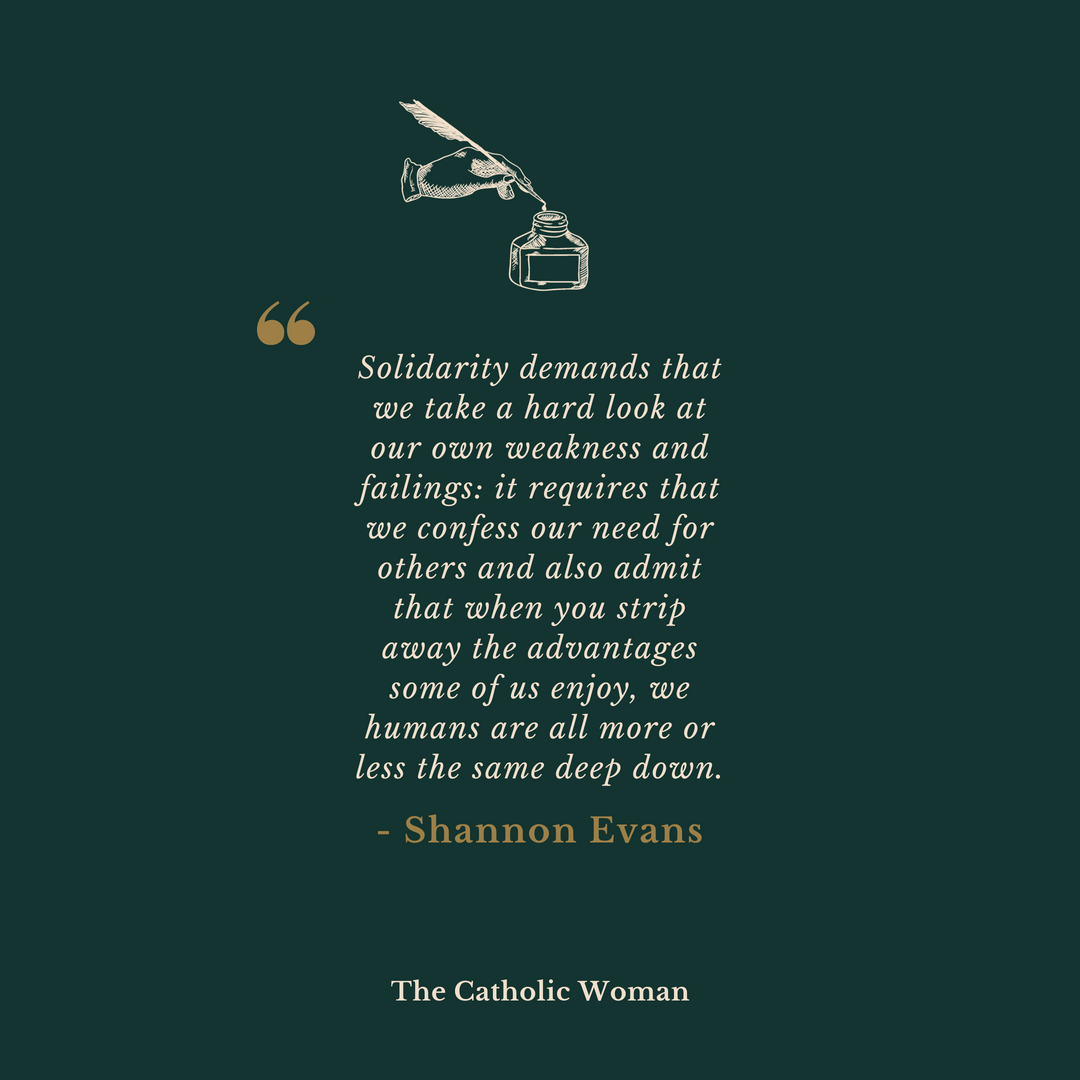Living in Solidarity with Those We Serve
A Letter from Shannon Evans
Dear friend,
I used to think it was up to me to save the world. Maybe you’ve been there. Maybe you are there. I spent much of my life running from good thing to good thing, hoping that something I did might have impact—might make a difference. Since childhood, my heart has burned with compassion and often sagged under the weight of all the world’s hurts and injustices. I didn’t know what to do, only that I wanted to help, and I thought that meant doing things for those less fortunate. Surely they needed me, right?
In this mindset, I volunteered at a nursing home, mentored an at-risk child, interned in a Kenyan orphanage, led a small group in a low-income area, spent two years as a missionary in Southeast Asia, and adopted a son. All of these experiences shaped me—and I am thankful—but they also left me with a nagging feeling I couldn’t put my finger on.
I was with people, but wasn’t one with them. Because I was giving from the resources of my own strength and not seeking to receive anything from them in return, I unwittingly distanced myself from those I sought to love. Maybe it sounds counterintuitive; maybe it seems as though seeking to receive something from a person in need is disordered and selfish. But the truth is a relationship that recognizes the dignity of both parties demands this.
Every human being has gifts, insight, and presence that are needed by the rest of us; some of us are in a position to have our offerings valued by the world, and some of us are not. That doesn’t mean some have less to offer—it means we have to create a world that elevates the voices of those who have been silenced. I have a beef with the common adage to people of privilege like myself to, “be a voice for the voiceless”. No one is voiceless. The marginalized don’t need me to be their voice; they need me to pass the microphone.
Catholic Social Teaching calls this solidarity. But it’s hard to let it truly take root by reading it off a page; you may have experienced that frustration firsthand. Luckily for me, while I was unpacking the Compendium of Social Teaching of the Church I was also having my pride dismantled through motherhood and was taking refuge in the quirky (and mostly homeless) community of a local Catholic Worker. The social Gospel suddenly had skin on, and I was changed.
I began seeking communion with those in need, eagerly hoping for their friendship and much-needed perspective to inform my narrow heart and worldview. My former model of service kept us in our respective roles of “the powerful” and “the needy”, but the model of solidarity blurs those lines. We are people with a mutual need for what the other can offer.
Can I be real here, though? Service is more comfortable than solidarity. It feels awfully good to be needed: to be the one who appears to have their act together and be able to check “good deeds” off the box in our conscience. Solidarity demands that we take a hard look at our own weakness and failings: it requires that we confess our need for others and also admit that when you strip away the advantages some of us enjoy, we humans are all more or less the same deep down.
The Gospel of Jesus Christ abolishes service model—for God himself gave up power and strength to put on human flesh. He didn’t hold back; he didn’t keep himself on a pedestal or sidestep potentially messy situations. He dove right in to share in our sufferings—to be a real friend, not someone who pops in and out when it’s convenient for him. He embodied solidarity, and he calls us to the same.
Compassion for the hurting of this world is required of us. But you and I also have a responsibility to seek a justice that respects the dignity of all people. This is true justice, and it’s not cheap. It will cost us our pride. It will cost us time, leisure, and convenience. It will cost us in vulnerability and in power. But friend, what we gain is far greater than what we lose: a greater love for Jesus, and life-giving relationships with the needy that look much more like what he intended. Behold, he is making all things new.
With grace and peace and so much hope,
Shannon Evans
Get to Know Shannon
Tell us a little bit about yourself!
Well, hi! I'm Shannon and I am a Texas transplant to Iowa trying to survive the cold winters. I've been married to my husband Eric, who is a campus minister at Iowa State, for almost 12 years and we have four little boys ages 8 to 6 months. I'm a writer for Blessed Is She, a blogger, and am currently authoring my first book with Our Sunday Visitor on the gift of weakness. I can't wait for it to come out next spring! I've been a co-host on the ecumenical Upside Down podcast for two years, and we've had some great conversations on the intersection of faith and social issues. I'm a slow-moving hippie at heart and you're most likely to find me shoeless and braless (I can say that because this is a women's website, right?) in my backyard drinking sweet tea while my kids play in the mud.
Where online can we keep up with you?
My blog is We, A Great Parade and if you head over there you can subscribe to my monthly newsletter, which I'm much better at than actually blogging! I'm on Facebook as Shannon Evans - We, A Great Parade, but spend most of my online time on Instagram. (@shannonkevans)
Want to repost this quote? Just press, save and share.







